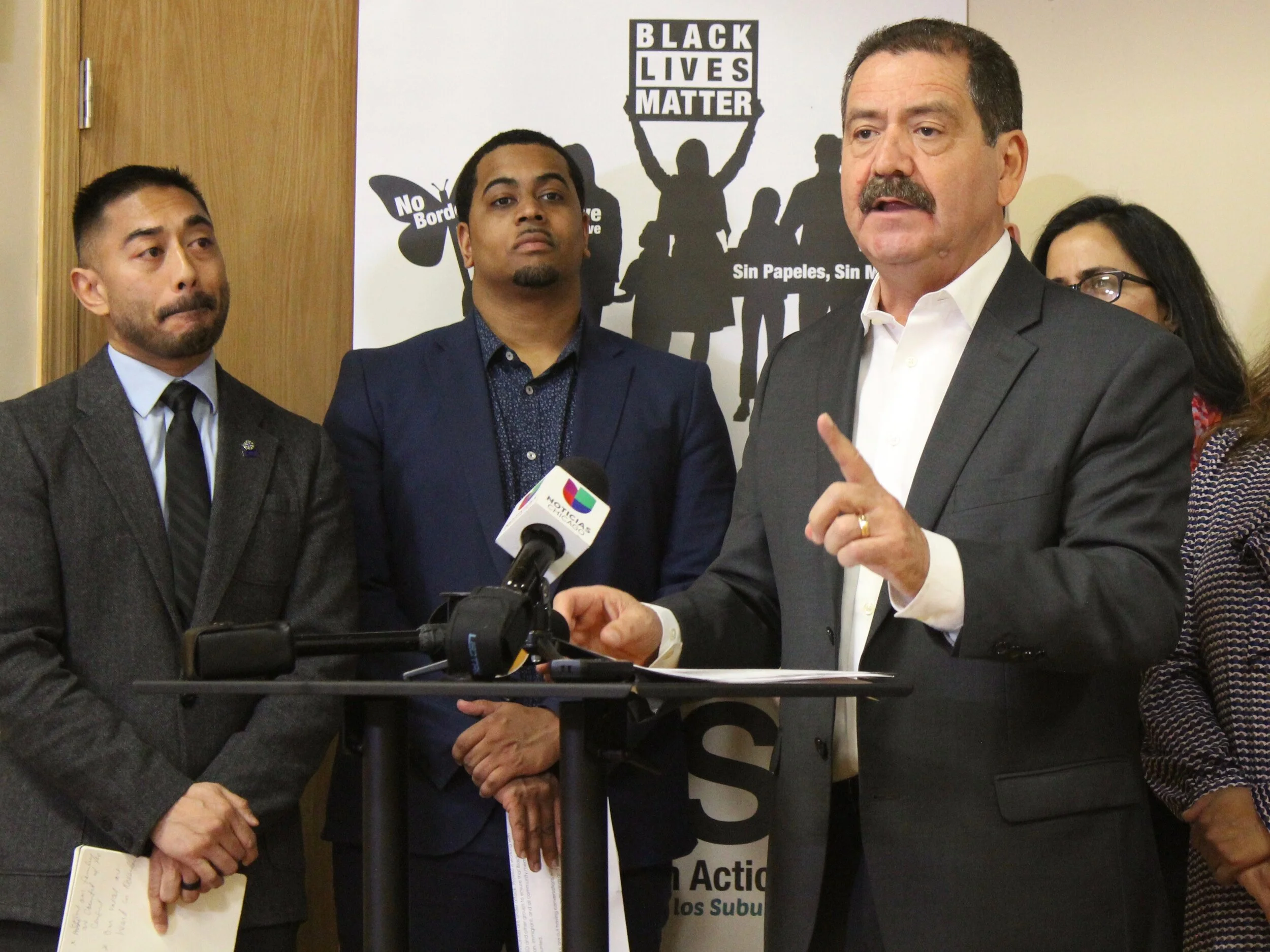Rep. Garcia calls public-charge rule a 'wealth tax'
New restriction takes effect as immigrant groups gird for Border Patrol
Congressman Jesus “Chuy” Garcia, Lawrence Benito of ICIRR, and Maywood Trustee Nathaniel Booker back state Sen. Celina Villanueva in criticizing new federal initiatives meant to intimidate immigrants. (One Illinois/Ted Cox)
By Ted Cox
MELROSE PARK — Immigrant groups in the Chicago area stepped up preparations for the arrival of Border Patrol tactical units Monday as the Trump administration’s so-called public-charge rule took effect.
At a news conference held in the Melrose Park offices of PASO, the West Suburban Action Project, U.S. Rep. Jesus “Chuy” Garcia of Chicago repeated his charge that the deployment of Border Patrol tactical units to sanctuary cities like Chicago was actually intended to suppress the 2020 U.S. Census count for Hispanics.
“This announcement can only be seen for what it is,” Garcia said, “one more effort to intimidate and scare our community and deprive us of the opportunity to to be counted in the Census.”
According to Garcia, Latinos are positioned to become recognized as the largest minority group in the nation with the final count from the 2020 Census. “We reject this latest threat as additional fearmongering,” Garcia said, “and we ask our community to participate enthusiastically in the Census.”
“We’re not going to stand for this. We won’t stand for this,” said state Sen. Celina Villanuaeva of Chicago. “We have fought back before and will continue to do it, because if you come for our community you come for us.”
Garcia and Villanueva also took shots at the Trump administration’s public-charge rule, which was officially slated to be implemented Monday while lawsuits continue to play out in the courts. The rule would weigh the immigration process against any applicants who appear to be at risk of becoming “public charges,” meaning that they might draw on public assistance like food stamps or housing aid.
Garcia called it “another initiative of the Trump administration, which seeks to restrict immigration and make it harder for working-class people to immigrate to this country.”
Labeling it “a part of the anti-immigrant, xenophobic vision” of the Trump administration, Garcia, said, “In essence, it is a wealth tax.” He added that its vague definition of who might qualify as a public-charge risk would give immigration officials no limit on discrimination.
“This is a radical departure from immigration policy and law that we reject and will continue to challenge in the courts,” Garcia said.
Villanueva, who was newly appointed to the Senate just this year, said it would “scare people off of assistance and social services and social programs that are meant to aid people.” Cook County Board President Toni Preckwinkle has previously charged that it would overburden the county health system.
“This announcement can only be seen for what it is — one more effort to intimidate and scare our community and deprive us of the opportunity to to be counted in the Census.”
U.S. Rep. Jesus “Chuy” Garcia (One Illinois/Ted Cox)
Lawrence Benito, executive director of the Illinois Coalition for Immigrant and Refugee Rights, blamed the federal initiatives on “presidential campaign politics” and charged that President Trump was resorting to the “politics of fear.”
“We’re clear about what’s at stake here,” he said, “the politics of division and hate … to promote a white-nationalist agenda that appeals to a certain segment of his base.”
“Our communities obviously continue to be under attack every day, and there’s new attacks happening,” said Mony Ruiz-Velasco, PASO director and chairwoman of the ICIRR board. “It’s very important that we address not only what’s happening in the city, but also what is happening in the suburbs.” The suburbs, she added, are where the majority of immigrants in the Chicago area live — an estimated 60 percent.
Activists have previously advised immigrants that, if confronted by immigration agents, they should remain silent and walk away unless placed under arrest, as the agents are not actually police officers, adding that residents have a right to privacy and to due process as well as a phone call if detained. They’ve advised residents not to open their doors to immigration agents, and to deny entry unless they have a warrant.
Benito said the same advice applies for those confronted by Border Patrol agents. That might complicate matters or confuse new U.S. residents when a census taker knocks at the door, but he added, “That’s why we’re working with local community organizations that are known in the community, established.” Benito said those groups are acting as go-betweens in getting census takers the information and neighborhood access they need to conduct an accurate head count.
Maywood Trustee Nathanial Booker said research has found that, for every 1 percent of the population not counted, Illinois would lose $1.2 billion in federal funding.
Garcia called on the Latino community to “remain vigilant but calm in everything that we do.”


